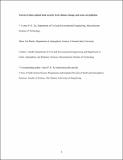Threat to future global food security from climate change and ozone air pollution
Author(s)
Martin, Maria Val; Heald, Colette L.; Tai, Amos P. K.
DownloadTai_2014_v1.6_manuscript.pdf (2.842Mb)
OPEN_ACCESS_POLICY
Open Access Policy
Creative Commons Attribution-Noncommercial-Share Alike
Terms of use
Metadata
Show full item recordAbstract
Future food production is highly vulnerable to both climate change and air pollution with implications for global food security. Climate change adaptation and ozone regulation have been identified as important strategies to safeguard food production, but little is known about how climate and ozone pollution interact to affect agriculture, nor the relative effectiveness of these two strategies for different crops and regions. Here we present an integrated analysis of the individual and combined effects of 2000–2050 climate change and ozone trends on the production of four major crops (wheat, rice, maize and soybean) worldwide based on historical observations and model projections, specifically accounting for ozone–temperature co-variation. The projections exclude the effect of rising CO₂, which has complex and potentially offsetting impacts on global food supply. We show that warming reduces global crop production by >10% by 2050 with a potential to substantially worsen global malnutrition in all scenarios considered. Ozone trends either exacerbate or offset a substantial fraction of climate impacts depending on the scenario, suggesting the importance of air quality management in agricultural planning. Furthermore, we find that depending on region some crops are primarily sensitive to either ozone (for example, wheat) or heat (for example, maize) alone, providing a measure of relative benefits of climate adaptation versus ozone regulation for food security in different regions.
Date issued
2014-07Department
Massachusetts Institute of Technology. Department of Civil and Environmental Engineering; Massachusetts Institute of Technology. Department of Earth, Atmospheric, and Planetary SciencesJournal
Nature Climate Change
Publisher
Nature Publishing Group
Citation
Tai, Amos P. K. et al. “Threat to Future Global Food Security from Climate Change and Ozone Air Pollution.” Nature Climate Change 4, 9 (July 2014): 817–821 © 2014 Rights Managed by Nature Publishing Group
Version: Author's final manuscript
ISSN
1758-678X
1758-6798